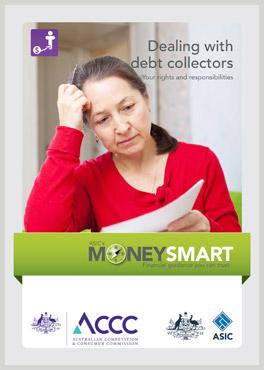What the ACCC does
- We help consumers understand their rights and responsibilities when disputing a debt.
- We accept reports and enquiries about debt collectors.
What the ACCC can't do
- We don’t provide legal advice about debt disputes.
Make sure you actually owe the debt.
If you’re not sure, ask the debt collector for proof. This can be an account statement or other document. The debt collector should provide this information to you when asked.
If you are contacted about an old debt, don’t confirm the debt in writing until you get legal advice. You may have a defence against the debt.
Get advice if you're still unsure whether you have to pay some or all of the debt. Free advice is available from the National Debt Helpline as well as community legal services.
Find out more about dealing with debt collectors by downloading our guide.

Once you’ve told the debt collector that the debt is in dispute, debt collection activity should stop until this is resolved.
A default listing on your credit report should not be made. To get a copy of your credit report and make sure it is correct, visit the ASIC MoneySmart website.
If a debt collector contacts you about a debt you have already paid, explain the situation in writing. Include copies of any documents that prove the debt has been paid.
If the debt collector continues to contact you, consider discussing the issue with a financial counsellor or lawyer. You may be able to complain to an external dispute resolution scheme. You can also report the issue to the ACCC.
You may accept that you owe the debt but disagree with the amount.
Ask for an itemised statement of your account that sets out:
If you’re approached about a debt you know nothing about, it may be a case of mistaken identity. Showing your driver's licence or other proof of identity may fix this, but a debt collector can’t force you to do this.
You should also get a copy of your credit report to make sure it is correct.
Some old debts can’t be recovered by a debt collector.
If you are contacted about an old debt, don’t make a payment or confirm the debt in writing until you get legal advice. You may have a defence against a debt if:
Generally, you can rely on this defence if:
In the Northern Territory, this period is 3 years.
If this is the case, recovery of the debt through the courts is said to be ‘statute-barred’. The courts won’t enforce the debt. If you think you’ve been contacted about a debt that is ‘statute-barred’, you should get legal advice.
Seek legal advice if you are being taken to court.
If you disagree with the debt, get legal advice. This could be because you think:
A defence is a legal reason why a debt can’t be enforced by a court. For example, there are laws that stop debts being collected through the courts after a certain time.
If you have a defence against paying the debt, you’ll need to file documents with the court. Seek legal advice before doing this.
You may still be able to negotiate a repayment plan. You can do this even if a court order has been made against you.
| Option | Further advice |
|---|---|
| Contact the National Debt Helpline | Call the National Debt Helpline on 1800 007 007 for free and confidential advice. |
| Complain directly to the debt collector | Use the sample complaint letter on the Financial Rights Legal Centre website. |
| Ask if the debt collector or creditor belongs to an external dispute resolution scheme | Nearly all financial service, energy, water and telecommunications businesses belong to an external dispute resolution scheme. This can help you with dispute resolution. |
| Lodge a complaint about debt collection relating to financial services | Contact the Australian Financial Complaints Authority to lodge a complaint about debt collection relating to loans, credit cards, or other financial services. You can also report misconduct to ASIC. |
| Lodge a complaint about debt collection relating to goods and services such as phone or utility bills, tradespeople or service providers | For phone or internet debts, contact the Telecommunications Industry Ombudsman. For energy debts, contact an energy ombudsman scheme. You can also report misconduct to the ACCC. |